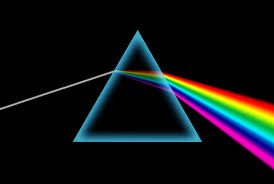HOMILY LENT WEEK 02 01- Year I
Seeing the Light
(Dan 9:3-10; Ps 79; Lk 6:36-38)
****************************************
 We do not see light – we see by light. The closest we come to actually seeing light is through a prism or a rainbow that displays the beauty of light.
We do not see light – we see by light. The closest we come to actually seeing light is through a prism or a rainbow that displays the beauty of light.
Today, I can’t resist looking at the readings once again through the prism of the 12 Step Program to shed light on the Word of God.
Steps 4 & 5 are all about repentance and receiving forgiveness (“Made a searching and fearless moral inventory” and “Admitted to God, ourselves and one other person, the exact nature of our wrongs”).
That is what Daniel is doing in the first reading – taking on himself all the sins and wrongdoing of the Israelites, expressing shame and contrition for them, and affirming God’s forgiveness. The Psalmist does the same – asking for forgiveness and that God will not hold the iniquity of the people against them.
Step 6 & 7 are all about healing and learning to forgive (“Became ready to have God remove all our defects of character” and “Humbly asked God to remove them all”).
That is what Jesus is talking about in the gospel. Our greatest defects of character are usually anger, resentment and bitterness at our being hurt by others, and our struggle to try to forgive them. So we hear Jesus say, “Be merciful as your heavenly father is merciful,” “Do not judge and do not condemn” – in a word, forgive others as God has forgiven us. This is exactly what we pray whenever we pray the Our Father.
What is missing in the readings, and what is so often missing in our lives and our society, is the art of the apology. So often when people are confronted with their hurtful behaviour, they don’t really apologize, perhaps because they don’t know how.
A sincere apology involves certain steps:
- Asking permission to share something personally with the other.
- Reminding them of your hurtful behaviour.
- Listening to their feelings about the incident and soaking up their pain (This is allowing them to start to forgive you).
- Making a declaration to change your behaviour and to try never to do that behaviour again.
- Humbly asking for forgiveness (without any expectations).
- Trying to make things right by making amends in whatever way possible.
One sexual abuser, when confronted by one of his victims in my presence, and asked for an apology, responded, “Well, I’m sorry if I hurt you.” That was not a true apology – it was more of an excuse, and a minimization of his actions. There was no real acknowledging of responsibility, no offer to make amends, and no declaration to change. This person clearly had no idea how to make an apology.
The Oblates to whom I belong issued a public apology at Lac St Anne in 1991 for the harmful legacy of the residential schools. One woman told me that she walked out of the church for ten years after that apology because no one took the time to hear her pain, to hear her story. The apology was done too quickly and missed that step.
So a holistic view of the readings today invites us to repent, to confess our wrongs, to try to make amends, and to also try to forgive those who have hurt us from the heart. Then we will have within us that new light and life that Jesus alone offers us.
The Eucharist is like a prism that sheds the light of God’s love and mercy on us, through Word and Sacrament.
May it empower us to repent, confess, set things right, and forgive from the heart, as bearers of the light of Christ ourselves.



